
Legendary fund manager Li Lu (who Charlie Munger backed) once said, 'The biggest investment risk is not the volatility of prices, but whether you will suffer a permanent loss of capital.' It's only natural to consider a company's balance sheet when you examine how risky it is, since debt is often involved when a business collapses. We note that Beiersdorf Aktiengesellschaft (ETR:BEI) does have debt on its balance sheet. But the real question is whether this debt is making the company risky.
Why Does Debt Bring Risk?
Debt assists a business until the business has trouble paying it off, either with new capital or with free cash flow. If things get really bad, the lenders can take control of the business. However, a more common (but still painful) scenario is that it has to raise new equity capital at a low price, thus permanently diluting shareholders. Of course, debt can be an important tool in businesses, particularly capital heavy businesses. The first thing to do when considering how much debt a business uses is to look at its cash and debt together.
Check out our latest analysis for Beiersdorf
What Is Beiersdorf's Net Debt?
The image below, which you can click on for greater detail, shows that Beiersdorf had debt of €20.0m at the end of December 2023, a reduction from €163.0m over a year. However, its balance sheet shows it holds €2.52b in cash, so it actually has €2.50b net cash.

How Strong Is Beiersdorf's Balance Sheet?
The latest balance sheet data shows that Beiersdorf had liabilities of €3.50b due within a year, and liabilities of €786.0m falling due after that. On the other hand, it had cash of €2.52b and €1.83b worth of receivables due within a year. So these liquid assets roughly match the total liabilities.
Having regard to Beiersdorf's size, it seems that its liquid assets are well balanced with its total liabilities. So it's very unlikely that the €32.5b company is short on cash, but still worth keeping an eye on the balance sheet. Simply put, the fact that Beiersdorf has more cash than debt is arguably a good indication that it can manage its debt safely.
On the other hand, Beiersdorf saw its EBIT drop by 2.9% in the last twelve months. If earnings continue to decline at that rate the company may have increasing difficulty managing its debt load. When analysing debt levels, the balance sheet is the obvious place to start. But ultimately the future profitability of the business will decide if Beiersdorf can strengthen its balance sheet over time. So if you want to see what the professionals think, you might find this free report on analyst profit forecasts to be interesting.
Finally, a business needs free cash flow to pay off debt; accounting profits just don't cut it. Beiersdorf may have net cash on the balance sheet, but it is still interesting to look at how well the business converts its earnings before interest and tax (EBIT) to free cash flow, because that will influence both its need for, and its capacity to manage debt. Looking at the most recent three years, Beiersdorf recorded free cash flow of 37% of its EBIT, which is weaker than we'd expect. That weak cash conversion makes it more difficult to handle indebtedness.
Summing Up
While it is always sensible to investigate a company's debt, in this case Beiersdorf has €2.50b in net cash and a decent-looking balance sheet. So we don't have any problem with Beiersdorf's use of debt. Above most other metrics, we think its important to track how fast earnings per share is growing, if at all. If you've also come to that realization, you're in luck, because today you can view this interactive graph of Beiersdorf's earnings per share history for free.
If, after all that, you're more interested in a fast growing company with a rock-solid balance sheet, then check out our list of net cash growth stocks without delay.
Valuation is complex, but we're here to simplify it.
Discover if Beiersdorf might be undervalued or overvalued with our detailed analysis, featuring fair value estimates, potential risks, dividends, insider trades, and its financial condition.
Access Free AnalysisHave feedback on this article? Concerned about the content? Get in touch with us directly. Alternatively, email editorial-team (at) simplywallst.com.
This article by Simply Wall St is general in nature. We provide commentary based on historical data and analyst forecasts only using an unbiased methodology and our articles are not intended to be financial advice. It does not constitute a recommendation to buy or sell any stock, and does not take account of your objectives, or your financial situation. We aim to bring you long-term focused analysis driven by fundamental data. Note that our analysis may not factor in the latest price-sensitive company announcements or qualitative material. Simply Wall St has no position in any stocks mentioned.
About XTRA:BEI
Beiersdorf
Manufactures and distributes consumer goods in Europe, the United States, Africa, Asia, and Australia.
Flawless balance sheet with solid track record and pays a dividend.

